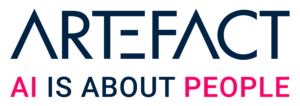In the early days of digital analytics, the concept of privacy was largely ignored. But today, privacy has become increasingly important, and rightly so: most consumers no longer want their every (digital) move to be tracked without their consent. Although it makes our lives as marketers and data analysts more challenging, it’s a positive thing that we’re moving to a landscape that respects end-user privacy.
With new regulations coming into effect, businesses need to be transparent about what data they collect, why they collect it, and how they use it. In addition, users need to be able to opt out of these terms as easily as they can opt in. As a result, marketers are faced with a significant decrease in consented first-party data to work with.
We believe that using minimal amounts of consented, first-party data to model outcomes with AI is where the future lies. This means using machine learning algorithms to build models that can generate insights from small data sets.
Here are some concrete examples:
These are just a few examples of how AI and modelling can be used to leverage minimal consented first-party data, while still protecting user privacy to gain valuable insights. To learn more about privacy and data collection, read this article.
However, it is important to remember that these tools are only as good as the data that they are trained on. If you want to use AI and modelling in a responsible and ethical way, you need to start by building trust with your customers and collecting data in a transparent and ethical manner. Here are a few tips to keep in mind:
Embrace the future by going back to basics
Digital data has always been imperfect – and always will be. But that’s okay! It simply means that if we haven’t found a way to solve a particular problem effectively, we can always start again. The important thing is to change our mindset and adopt a new approach to digital analytics: one that’s more respectful of user privacy, more focused on solving real-world problems, and more mindful of the unintended consequences of our actions.
Instead of trying to find new tricks, loopholes and tools to collect customer data, let’s get back to the basics. Accept that you can’t know every little detail about your customers. Learn to use what you do know and optimise it with the power of AI and modelling. But only do so if the benefits extend beyond you and your company. Also, be aware of the unintended consequences of your actions. If you use data to solve one problem, be aware of the potential negative impact on other areas.
Some of the many ways Artefact can help
For us, data is about people. And that will never change. If you could use a little (or a lot) of help in navigating this new era of digital marketing and/or digital analytics, please feel free to reach out to us. We’re here to help you succeed. Our way of working includes:

 BLOG
BLOG





